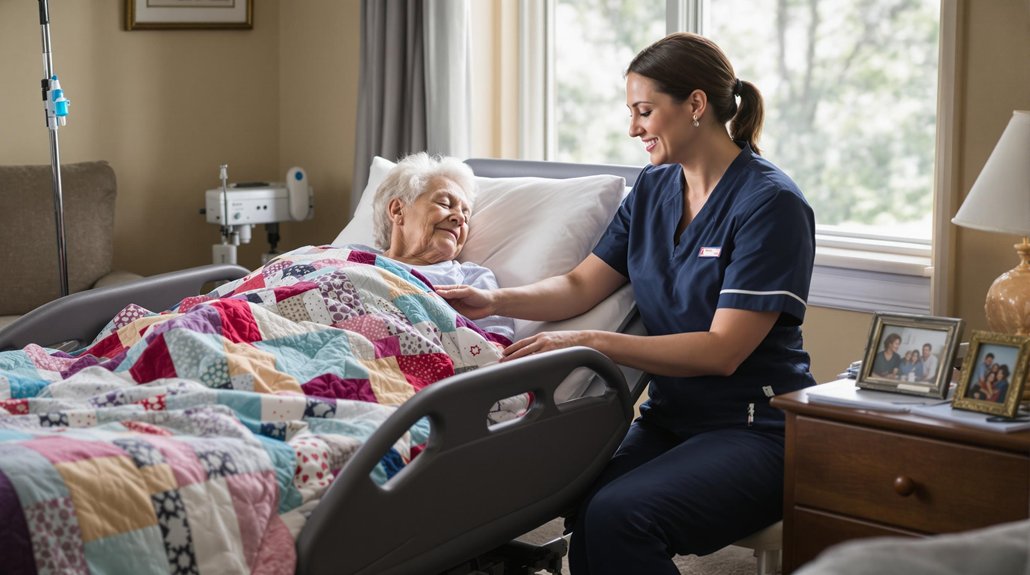The four levels of hospice care are designed to meet your loved one’s specific needs during end-of-life care. Routine home care offers regular visits from the hospice team in a home setting, while continuous home care provides intensive 24-hour support during medical crises. Inpatient respite care gives family caregivers temporary relief, and general inpatient care manages complex symptoms in a facility setting. Understanding each level’s unique purpose helps you make informed decisions for your family member’s comfort and dignity.
Understanding the Purpose and Philosophy of Hospice Care
Compassion forms the cornerstone of hospice care, a specialized approach that focuses on improving quality of life for individuals facing terminal illness.
When you understand the hospice philosophy, you’ll recognize that it’s centered on providing comfort rather than seeking a cure. This means addressing not just physical symptoms, but also emotional, social, and spiritual needs.
The core mission prioritizes patient dignity by empowering both patients and their loved ones to make informed decisions about their care journey.
You’ll find that hospice teams work to guarantee your family member maintains autonomy while receiving expert pain management and symptom control.
This thorough support system helps create meaningful moments and lasting memories during life’s final chapter, allowing patients to live as fully and comfortably as possible until the end.
Through skilled nurses and caregivers, patients receive comprehensive medical attention and comfort care techniques that enhance their daily quality of life.
Routine Home Care: The Foundation of Hospice Services
While many people associate hospice exclusively with end-of-life care in medical facilities, routine home care actually represents the most common level of hospice service.
Through this foundational level of care, you’ll work with a dedicated team that visits your loved one in their residence, whether that’s a private home, nursing facility, or assisted living community.
Your hospice team will focus on patient comfort through regular visits, typically 1-3 times per week, depending on your loved one’s needs.
A nurse coordinates care between team members, including social workers, home health aides, chaplains, and volunteers. They’ll manage medications, provide emotional support, and teach you essential caregiving skills.
You’ll also have 24/7 access to phone support for questions or concerns that arise between scheduled visits.
The team specializes in palliative care services to ensure effective pain management and symptom control throughout the end-of-life journey.
Continuous Home Care: Managing Acute Symptoms
A critical step up from routine care, continuous home care becomes necessary when your loved one experiences severe symptoms or medical crises requiring close monitoring.
During this intensive level of care, skilled nursing staff provide round-the-clock symptom management in your home, typically for 8-24 hours during particularly challenging periods.
Your hospice team focuses on stabilizing acute symptoms like severe pain, breathing difficulties, or anxiety that can’t be managed through routine care alone.
This heightened level of support guarantees your loved one receives immediate attention while remaining in familiar surroundings.
The team also provides essential caregiver support, teaching you how to handle complex care needs and offering emotional guidance during stressful periods.
Once symptoms are under control, care usually returns to the routine level.
Private duty nursing services are available to ensure continuous medical supervision and specialized care during these challenging times.
Inpatient Respite Care: Supporting Family Caregivers
When family caregivers need a temporary break from their caregiving duties, inpatient respite care provides essential relief by transferring their loved one to a hospice facility for up to five days.
You’ll find this caregiver support invaluable for maintaining your emotional resilience while caring for a terminally ill family member. During respite care, your loved one receives 24/7 professional medical attention in a comfortable setting while you take time to rest, handle personal matters, or attend important events.
This brief separation allows you to recharge and return to your caregiving role with renewed energy and focus.
Skilled nursing caregivers provide specialized support for seniors with complex medical needs and chronic conditions during the respite care stay.
Medicare and most private insurance plans cover respite care stays, making it an accessible option when you need temporary assistance. Don’t hesitate to ask your hospice team about scheduling respite care to support your wellbeing.
General Inpatient Care: Specialized Medical Attention
If a patient’s pain or symptoms become too complex to manage at home, general inpatient care provides round-the-clock medical supervision in a hospital, hospice facility, or skilled nursing center.
This specialized care offers intensive symptom management during medical crises. You’ll find a team of healthcare professionals monitoring your loved one’s condition continuously, adjusting medications, and responding immediately to changes in their status.
The medical staff works to stabilize symptoms so your family member can return to their previous care setting.
During general inpatient care, you’ll have access to nurses, doctors, and specialists who focus on your loved one’s comfort. They’ll address acute symptoms like severe pain, breathing difficulties, or other distressing conditions that require advanced medical intervention.
This level of care continues until your loved one’s symptoms become manageable.
Similar to post-surgical recovery care, patients receive skilled nursing care and continuous monitoring to prevent complications and ensure optimal comfort.
When to Consider Each Level of Hospice Care
Understanding the right level of hospice care depends on your loved one’s specific needs and medical condition.
You’ll want to evaluate routine home care when your family member can safely receive services at home with support from caregivers.
Choose continuous care during medical crises requiring round-the-clock nursing.
Examine general inpatient care when your loved one needs intensive symptom management that can’t be provided at home.
This level often involves timing considerations for shifting between hospital and home settings.
Respite care becomes essential when primary caregivers need a temporary break from their duties.
Stay alert to care shifts, as your loved one’s needs may change between these levels.
Work closely with the hospice team to adjust the level of care as symptoms, comfort requirements, and family circumstances change.
Making the Right Choice for Your Loved One
Selecting the right level of hospice care requires careful evaluation of your loved one’s physical condition, emotional needs, and available support system. Consider involving your care team in the decision making process and assess both current needs and potential future changes.
| Considerations | Key Questions |
|---|---|
| Medical Status | Is pain well-managed? Are symptoms stable? |
| Living Situation | Can they remain home safely? Is 24/7 care needed? |
| Caregiver Support | Are family caregivers available? Are they experiencing burnout? |
| Financial Resources | What does insurance cover? Are there out-of-pocket costs? |
You’ll want to regularly reassess your choice as conditions change. Don’t hesitate to discuss concerns with the hospice team – they’re there to support both your loved one and you during this journey. Remember, you can adjust the level of care as needed to guarantee the best possible quality of life.
Conclusion
Understanding these four levels of hospice care – routine home, continuous home, inpatient respite, and general inpatient – helps you choose the best path for your loved one. Think of hospice care like a warm blanket of support that wraps around your entire family. Our caring team walks beside you, holding your hand through each step, making sure you never have to face these challenges alone. Just as every sunrise brings new light, each day brings new ways we can help make this journey more comfortable for you and your loved one.
If you or a loved one need help, don’t wait. Reach out to Focus Family Care today at (561) 693-1311 or email us at info@focusfamilycare.com.





